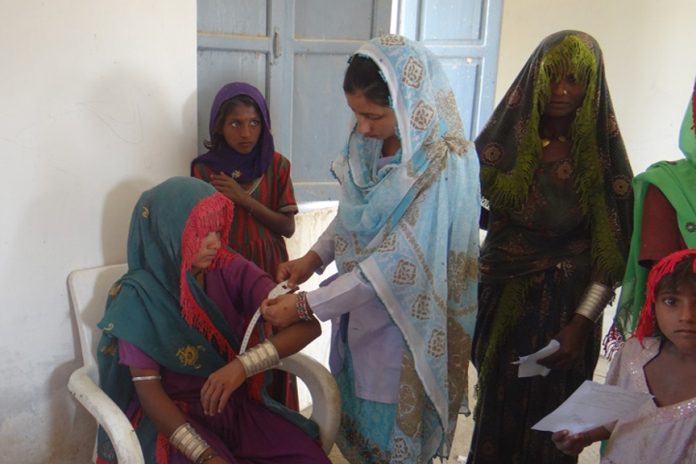
Written By pirah phuti
The price of poverty in rural Sindh is a mother’s life. After hours of agonizing procedures, she was humiliated and expelled, her death a consequence of willful negligence vanished without a whisper.
Some deaths are not mere accidents; they are proof that our system is failing. This is the truth of the tragedy in Allahno Parhyar village, Keti Bunder Deh Dolo Sholani, Taluka Keti Bunder, District Thatta.
A mother was sacrificed to utter incompetence. She was a poor, voiceless woman whose life was considered so cheap that her death, which is 100% true and factual, never became a news headline.
Every pregnant woman makes a promise: “I will hold you inside me, protect you with every breath, and try to keep you alive at any cost.” While a woman accepts the risk of childbirth, this death was not natural; it was murder by malpractice.
The Tragic Timeline
The victim, wife of Sadiq Parhyar, sought help from the local practitioner the self-styled “doctor” and midwife Laila Memon.
She was brought to the clinic on September 27 (daytime). The delivery case was not normal it was complicated and required a skilled gynecologist and proper medical facility. However, driven by greed for money, the midwife took full responsibility, assuring the family she could handle it. After mishandling the labor for hours, the delivery was finally conducted with great difficulty at around 3:00 AM on September 28.
The newborn baby girl was born showing clear signs of distress, including swelling and redness on the head, indicating a risky and mismanaged delivery.
The real crisis began when the midwife failed to deliver the afterbirth (placenta). Despite the mother’s worsening condition, she refused to refer the patient to a hospital, continuing dangerous and unscientific interventions out of stubbornness and greed.
She administered wrong injections, inappropriate drips, and, in a shocking act of negligence, ordered another heavy woman to sit on the patient’s abdomen in an attempt to force the placenta out a brutal and untrained practice that caused severe internal bleeding. By 8:00 AM on the morning of September 28, the mother was in a critical state, barely alive. Instead of showing remorse, the midwife shouted at the relatives and expelled the patient from her clinic, demanding they take her away immediately. She was fully aware that the patient’s condition had become critical and that she might not survive beyond half an hour to two hours. Fearing she would die inside the clinic and she would be held responsible, the midwife chose to throw her out in a state of severe agony and humiliation.
The family tried to rush her to another hospital for help, but she passed away on the way just 3 to 4 kilometers from Laila Memon’s clinic.
Her final breaths were taken on the road, not under care, and her death was treated as an inconvenience to be hidden, never recorded.
A Mother’s Divine Sacrifice
A woman’s act of giving life is akin to a divine miracle. When pregnant, her eyes hold a terrifying contrast: a deep fear of the unknown and the constant spark of light the hope of bringing a new life into the world. This new light is her reason. She knows she is constantly hovering between life and death. She shares everything with her unborn child: air, blood, food, nutrients, moods, joy, and fear. She carries the physical weight of her own body and the burdens of the world, yet she shelters and sustains a new life. Adding to the social injustice, it seems nature itself is unfair: while society calls women weak, their immune system sometimes collaborates with this injustice. Biologically, the normal range for crucial elements like hemoglobin is often lower in women. When she is pregnant, the demands on her already fragile body make her life inherently risky. This vulnerability makes the need for skilled care a matter of life or death, which this mother was cruelly denied.
Amid this cruelty, the newborn baby girl survived a living testament to her mother’s promise. But she now enters a world already unjust to her gender.
A Death That Vanished Without a Trace.
Why did this death vanish without a trace? A woman’s life is valued so little that a tragedy like this is not even considered worthy of a record. People excuse this by saying, “It was a mistake, she didn’t mean to kill her.” But negligence that kills is not a simple mistake; it Is a crime. The common person cannot think about seeking justice because so many deaths go unrecorded, and any legal fight against a local power figure is instantly dismissed.
Under Section 322 of the Pakistan Penal Code (Qatl-bis-sabab), such acts are legally defined as manslaughter by negligence a criminal offense punishable by imprisonment. Yet, in rural Sindh, justice rarely reaches the poor. Legal battles against local power figures are dismissed before they begin. This tragedy is not isolated it exposes a broken healthcare system where untrained and unlicensed practitioners thrive due to corruption and impunity.
The Corruption Behind the Crime.
The rise of these untrained practitioners is a choice made by a corrupt system. This environment exists because getting a PNC (Pakistan Nursing Council) or PMDC (Pakistan Medical and Dental Council) certificate is often proof of money and connections, not skill. Everything is for sale even licenses, even lives. These practitioners are often people who have no formal education and gain just basic experience working with a doctor. Even if they have a PNC license, they are neither legally allowed nor trained to run an independent hospital or handle complex emergencies alone. Their job is simply to stabilize the patient and move them to a proper hospital. Driven by greed, they ignore these rules, leading directly to patient deaths.
The Larger Human Rights Context.
Pakistan already suffers one of the highest maternal mortality rates in South Asia.
Each unrecorded death like this widens the gap from achieving UN Sustainable Development Goal 3 (Good Health & Well-being). A government that fails to protect mothers fails its very foundation because no nation can rise when its women die unseen.
A Demand for Justice and Immediate Action
We demand that the government cease treating the lives of its citizens as expendable. Justice for the deceased mother requires immediate and decisive action across the province: thorough investigations must be launched in all backward areas of Sindh to identify and permanently shut down every untrained and illicit hospital and clinic. Their documents must be declared fraudulent, and their practices deemed a criminal enterprise.
Furthermore, the authorities must arrest and prosecute Midwife Laila Memon for criminal negligence leading to homicide. If the life of a single human being holds any significance to this government, they must act now. Ignoring this death sends the clear message that in our society, the life of a poor woman or any other woman is worthless.

























